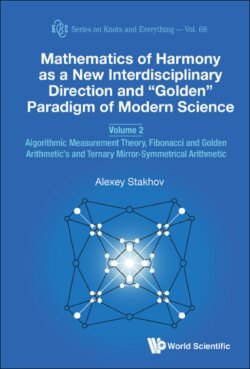Читать книгу Mathematics of Harmony as a New Interdisciplinary Direction and “Golden” Paradigm of Modern Science - Alexey Stakhov - Страница 16
На сайте Литреса книга снята с продажи.
1.4.3. Research by Alexander Zenkin
ОглавлениеIn the recent years, in the works of the outstanding Russian mathematician and philosopher Alexander Zenkin [126], as well as in the works of other authors [127–129], radical attempts have been made to “purify” mathematics from Cantor’s theory of sets based on conception of actual infinity (Fig. 1.3).
Fig. 1.3. Alexey Stakhov and Alexander Zenkin.
(Moscow University, April 29, 2003: Stakhov’s lecture “A New Type of the Elementary Mathematics and Computer Science Based on the Golden Section”, delivered at the joint meeting of the seminar Geometry and Physics, Department of Theoretical Physics, Moscow University, and Interdisciplinary Seminar Symmetries in Science and Art of the Institute of Mechanical Engineering, Russian Academy of Sciences.)
The analysis of the Cantor theory of infinite sets, presented in [126], led Alexander Zenkin to the conclusion that the proofs of many of Cantor’s theorems are logically incorrect, and the Cantor theory of the infinite sets is in a certain sense the mathematical hoax of the 19th century. Some famous mathematicians of the 19th century were fascinated by Cantor’s theory and, by accepting his unusual theory without proper critical analysis, elevated it to the rank of the greatest mathematical discovery of the 19th century and laid the foundations of mathematics.
The discovery of the paradoxes in the Cantor theory of the infinite sets considerably cooled the enthusiasm of mathematicians toward this theory. Alexander Zenkin [126] put the final point in the critical analysis of Cantor’s theory. He showed that the main Cantor error was the adoption of abstraction of the actual infinity, which, according to Aristotle, is unacceptable in mathematics.
But without the abstraction of actual infinity, Cantor’s theory of infinite sets is untenable! As mentioned above, Aristotle was the first scientist and thinker who drew attention to this problem and warned about the impossibility of using the concept of the actual infinity in mathematics (“Infinitum Actu Non Datur”).
In Stakhov’s article [129], the following question was posed: “Is modern mathematics not standing on the “pseudoscientific” foundation?” So far, mathematicians have not answered this question concerning the foundations of mathematics.
